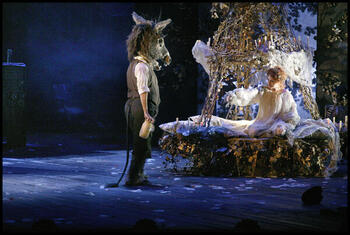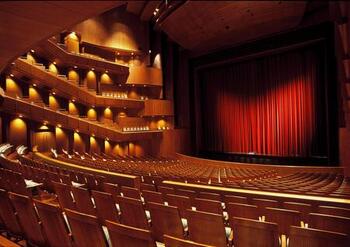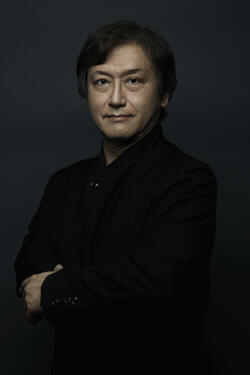Interview: ONO Kazushi - Plans towards Re-opening of the NNTT
―In the 2019/20 season, several opera productions scheduled at the New National Theatre, Tokyo (NNTT) had to be cancelled due to the Covid-19 outbreak. In the case of Handel's Giulio Cesare in March 2020, director Laurent Pelly and conductor Rinaldo Alessandrini were already in Japan and rehearsals were well under way, so it must have been particularly heartbreaking. I saw the video recording of the last rehearsal, and I was heartened when you told the artists that you will stage the opera again in the future.
Ono: It was a really difficult moment, and my voice was breaking. I really didn't know what to say to everyone. We are trying to reschedule Giulio Cesare and Wagner's Die Meistersinger von Nürnberg in the coming seasons. However, there are so many people involved in an opera production that we are still trying to work out whether the orchestra and the cast members are available for the new dates. Fortunately, the directors and the singers all tell us that they definitely want to come back and perform at the NNTT. The official negotiations will follow but we take heart in their enthusiasm.
―How did you spend the stay-home period?
Ono: Well, I did a lot of walking - in fact I managed to lose some weight! Every day I walked over 10,000 steps. Walking at night through Ginza or Shiodome, which were virtually deserted, I felt like I was in a parallel world. I also rented a studio and played the piano a lot. I played and sang through the whole of Meistersinger in a day, which I should have conducted at the theatre! From the beginning to the end, I sang every single role.
―Could you tell us the plans towards re-opening of the NNTT? You recently did some trial concerts with the Tokyo Metropolitan Symphony Orchestra, of which you are Music Director, in preparation for the resumption of concerts, and the results have been published online.
Ono: We've started some trials at the NNTT too. Today (25 June), we examined the layout of the orchestra, together with the orchestra staff. We discussed how we can create a well-ventilated environment so that musicians can play with confidence, and how much distance we should keep between the instrument groups. What I consider important is not only the physical distancing, but the "musical distancing". Together we have to search for the acceptable distance where the players can play and listen to each other without effort. We have to consider the logistics, including what to do about the wall between the pit and the auditorium, or how deep the pit should be.
―I'm sure many classical music and opera fans are eager to attend live performances. Several orchestras have now resumed activities, but it's more difficult for the opera companies, and the chorus in particular is an issue. What are the steps being taken by the NNTT regarding its highly acclaimed chorus?
Ono: Today we examined the orchestra pit. Next we are planning an examination by specialists of the ventilation of the auditorium. They will measure the air flow and how quickly the air is ventilated. After that, we will have a trial performance with the orchestral players. In the TMSO trials, we measured how far droplets travel with solo singers, but with the chorus we will test how much distance a singer should keep each side and front/rear. Also we want to find out at what speed singers can move while maintaining social distancing. ―The situation is still uncertain and hard to predict, but the first opera production of the new season is Britten's A Midsummer Night's Dream opening on 4 October.
―The situation is still uncertain and hard to predict, but the first opera production of the new season is Britten's A Midsummer Night's Dream opening on 4 October.
Ono: We hope to start rehearsals as planned in early September. There will probably be restrictions regarding the staging but we will discuss these issues with director. Also, there is the problem of whether the international singers and creative team will be permitted to enter Japan because of current travel and visa restrictions*. There are already many Japanese singers in the cast, but we are not certain whether the international singers can join us. So, we will make sure that in case they can't come, the Japanese cover cast will be fully prepared and we can open on the first night. If the director can't come, his assistant has told me that she can direct the singers remotely via skype. We will have an assistant director on our side too, and we will connect via video screen and communicate. This might become a "new style" of opera directing!
*Due to current travel restrictions from overseas, international artists who were scheduled to perform in "A Midsummer Night's Dream" will not be able to come to Japan. As of 8 September, NNTT announced that the cast will be replaced by the artists who reside in Japan.
―It all sounds very futuristic!
Ono: Yes, I think interesting things are happening. Our next opera production will be the world premiere of our new commission to Dai Fujikura, Dream of Armageddon. It's a new work that NNTT has put a lot of focus on, and there is a lot of international interest, so we really want to make it happen. Then in December, we will perform Die Fledermaus. The chorus plays an important role in this opera, so hopefully the rehearsal environment will have improved by then.
―Because of the uncertainty of the current situation, one needs to be flexible and one has to have the ability to adapt to changes. Since you have worked in many of the world's opera houses, you must be used to thinking flexibly.
Ono: It's true, one needs to be flexible to work in an opera house. Even in normal times, we often have to deal with the lead singer who has a throat infection, and quickly find a replacement. Such risk management skills are definitely necessary in working in an opera house. As we prepare to re-open the theatre, I'm sure many people are still worried about whether it's really safe to attend. So we need to proceed slowly, securing first the safety of the production side, and of course the safety of our audience. We don't want people to feel uneasy in coming to the theatre. In classical music, there are many elderly people in the audience, so we want to find a way to re-start safely and gently.
―Do you take guidance from how other opera houses are proceeding with re-opening?
Ono: That's important too, although each country and each opera house seem quite different. One thing is certain - in the past, we enjoyed a borderless society where international artists, audience members, and tourists could cross borders at will, but this will probably change. Each country will control its borders and stop foreign nationals from entering as necessary. I think this is a rational decision at this moment. Therefore, we need a new idea instead of the traditional way of producing operas. I don't think we can just hope things will return to normal.
―Will this situation lead to more Japanese singers appearing on the NNTT stage?
Ono: I'm sure there will be more opportunities for Japanese singers. I strongly hope they will take up the challenge.
―During this closure, many Friends of the NNTT have sent messages of support to the house. Do you have a message for the Friends?
Ono: What I would like to emphasize above all is that in the new season we will try our best not to cancel any performances. Of course, if the outbreak worsens, there might be a situation when we have to close the doors again, so we need to be flexible, but apart from that, the show must go on. This is what I would like to convey most.
―It's a very heartening message. We are eagerly waiting for the re-opening of the theatre.
Ono: The arts play an important role in our lives. During the current crisis, of course the priority has been to save lives. Next, we have to normalize social activities and keep the economy going in order to sustain our lives. This is the second phase. Then comes the third phase, which is to feel emotionally moved. This is such a beautiful feeling. It's unique, and it's our raison d'être. If these three things don't come together, we are not human. And it's the arts and culture that move our emotions. In particular, opera is a synthesis of literature, fine art and music. I sincerely hope that opera will always be close to us as our spiritual nourishment, giving us joy. As people of the theatre, we want to be able to provide this at all times. When we had to cancel five productions in a row, we sighed with sorrow. But those days are now over. We need be more creative, in order to stimulate the most important part of us as human beings. We want people to believe again that they can find this in the theatre. As we re-open, we may need to ask for your cooperation, but with your support, I'm sure opera will recover.


